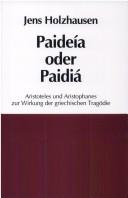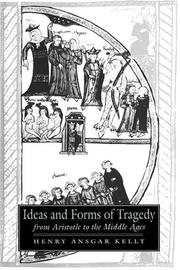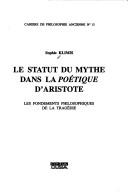| Listing 1 - 6 of 6 |
Sort by
|
Book
ISBN: 3610090006 9783610090005 Year: 1987 Volume: 180 Publisher: Frankfurt am Main Athenäum
Abstract | Keywords | Export | Availability | Bookmark
 Loading...
Loading...Choose an application
- Reference Manager
- EndNote
- RefWorks (Direct export to RefWorks)
Classical Greek literature --- Drama --- Aristotle --- Tragic, The --- Tragique --- Ethics --- Morale --- Aristote, --- Greek drama (Tragedy) --- History and criticism --- Theory, etc --- Aristotle. --- -Tragedy --- Greek drama --- -Theory, etc --- Aristoteles. --- Aristoteles --- Contributions in concept of the tragic. --- Aristote --- Aristotile --- Ethics. --- Tragedy --- History and criticism&delete& --- Ἀριστοτέλης. --- Greek drama (Tragedy) - History and criticism - Theory, etc --- Aristotle. - Poetics --- Aristote, 384-322 av JC
Book
ISBN: 3050026413 Year: 1994 Publisher: Berlin Akademie Verl.
Abstract | Keywords | Export | Availability | Bookmark
 Loading...
Loading...Choose an application
- Reference Manager
- EndNote
- RefWorks (Direct export to RefWorks)
Emoties in de literatuur --- Emotions dans la littérature --- Emotions in literature --- 875-21 --- Tragic, The, in literature --- Greek drama (Tragedy) --- -Orestes (Greek mythology) in literature --- Greek drama --- Griekse literatuur: tragedie --- History and criticism --- -Theory, etc --- Aeschylus. --- Aristoteles. --- Sophocles --- Aristoteles --- Eskhil --- Eschylus --- Aischylos --- Esquilo --- Eschilo --- Aiskhilos --- Eshil --- Æskílos --- Ajschylos --- Eschil --- Eschyle --- Äschylos --- Eskili --- Aiszkhülosz --- Eschylos --- Iskilos --- Эсхил --- אייסכילוס --- איסכילאס --- איסכילוס --- إيسخولوس --- ايسخيلوس --- Αἰσχύλος --- Contributions in concept of the tragic. --- 875-21 Griekse literatuur: tragedie --- Aristote --- Aristotle --- Aristotile --- Sofokles --- Sophocle --- Sofocle --- Sophokles --- Sofocles --- Orestes (Greek mythology) in literature --- History and criticism&delete& --- Theory, etc --- Aristotle. --- Sophocles. --- Ἀριστοτέλης. --- Aeschylus

ISBN: 3515076794 Year: 2000 Publisher: Stuttgart Steiner
Abstract | Keywords | Export | Availability | Bookmark
 Loading...
Loading...Choose an application
- Reference Manager
- EndNote
- RefWorks (Direct export to RefWorks)
Aristophanes --- -Greek drama (Tragedy) --- -Greek drama --- Aesthetics --- History and criticism --- -Theory, etc --- Aristoteles --- Contributions in concept of the tragic. --- Greek drama (Tragedy) --- Aesthetics. --- Theory, etc. --- -Aesthetics --- Aristote --- Aristotle --- Aristotile --- Greek drama --- History and criticism&delete& --- Theory, etc --- Aristotle. --- Aristoteles. --- Arisṭāṭṭil --- Aristo, --- Aristotel --- Aristotele --- Aristóteles, --- Aristòtil --- Arisṭū --- Arisṭūṭālīs --- Arisutoteresu --- Arystoteles --- Ya-li-shih-to-te --- Ya-li-ssu-to-te --- Yalishiduode --- Yalisiduode --- Ἀριστοτέλης --- Αριστοτέλης --- Аристотел --- ארסטו --- אריםטו --- אריסטו --- אריסטוטלס --- אריסטוטלוס --- אריסטוטליס --- أرسطاطاليس --- أرسططاليس --- أرسطو --- أرسطوطالس --- أرسطوطاليس --- ابن رشد --- اريسطو --- Pseudo Aristotele --- Pseudo-Aristotle --- アリストテレス
Book
ISBN: 0691068992 1306985889 0691607389 1400862574 9780691068992 9781400862573 9780691607382 Year: 1992 Publisher: Princeton, N.J. Princeton University Press
Abstract | Keywords | Export | Availability | Bookmark
 Loading...
Loading...Choose an application
- Reference Manager
- EndNote
- RefWorks (Direct export to RefWorks)
Elizabeth Belfiore offers a striking new interpretation of Aristotle's Poetics by situating the work within the Aristotelian corpus and in the context of Greek culture in general. In Aristotle's Rhetoric, the Politics, and the ethical, psychological, logical, physical, and biological works, Belfiore finds extremely important but largely neglected sources for understanding the elliptical statements in the Poetics. The author argues that these Aristotelian texts, and those of other ancient writers, call into question the traditional view that katharsis in the Poetics is a homeopathic process--one in which pity and fear affect emotions like themselves. She maintains, instead, that Aristotle considered katharsis to be an allopathic process in which pity and fear purge the soul of shameless, antisocial, and aggressive emotions. While exploring katharsis, Tragic Pleasures analyzes the closely related question of how the Poetics treats the issue of plot structure. In fact, Belfiore's wide-ranging work eventually discusses every central concept in the Poetics, including imitation, pity and fear, necessity and probability, character, and kinship relations.Originally published in 1992.The Princeton Legacy Library uses the latest print-on-demand technology to again make available previously out-of-print books from the distinguished backlist of Princeton University Press. These editions preserve the original texts of these important books while presenting them in durable paperback and hardcover editions. The goal of the Princeton Legacy Library is to vastly increase access to the rich scholarly heritage found in the thousands of books published by Princeton University Press since its founding in 1905.
Classical Greek literature --- Aesthetics --- Drama --- Aristotle --- Tragedy --- -Poetics --- -Poetry --- Greek influences --- History --- -Technique --- Aristoteles. --- Aristoteles --- Aristote --- Aristotile --- Aesthetics. --- Influence. --- Contributions in concept of the tragic. --- Poetics --- Greek influences. --- Aristotle. --- Ἀριστοτέλης. --- Arisṭāṭṭil --- Aristo, --- Aristotel --- Aristotele --- Aristóteles, --- Aristòtil --- Arisṭū --- Arisṭūṭālīs --- Arisutoteresu --- Arystoteles --- Ya-li-shih-to-te --- Ya-li-ssu-to-te --- Yalishiduode --- Yalisiduode --- Ἀριστοτέλης --- Αριστοτέλης --- Аристотел --- ארסטו --- אריםטו --- אריסטו --- אריסטוטלס --- אריסטוטלוס --- אריסטוטליס --- أرسطاطاليس --- أرسططاليس --- أرسطو --- أرسطوطالس --- أرسطوطاليس --- ابن رشد --- اريسطو --- Pseudo Aristotele --- Pseudo-Aristotle --- アリストテレス --- Aristote (0384-0322 av. J.-C.) --- Esthétique --- Influence

ISBN: 0521431840 0521023777 0511470339 0511833733 Year: 1993 Publisher: Cambridge Cambridge University Press
Abstract | Keywords | Export | Availability | Bookmark
 Loading...
Loading...Choose an application
- Reference Manager
- EndNote
- RefWorks (Direct export to RefWorks)
'Tragedy' has been understood in a variety of conflicting ways over the centuries, and the term has been applied to a wide range of literary works. In this book, H. A. Kelly explores the various meanings given to tragedy, from Aristotle's most basic notion (any serious story, even with a happy ending), via Roman ideas and practices, to the middle ages, when Averroes considered tragedy to be the praise of virtue but Albert the Great thought of it as the recitation of the foul deeds of degenerate men. Professor Kelly demonstrates the importance of finding out what writers like Horace, Ovid, Dante and Chaucer meant by the term, and how they used it as a tool of interpretation and composition. Referring to a wealth of texts, he shows that many modern analyses of ancient and medieval concepts and works are oversimplified and often result in serious misinterpretations. The book ends with surveys of works designated as tragedies in England, France, Italy and Spain.
Drama --- anno 500-1499 --- Antiquity --- 82-21 --- Tragedy --- Classical drama --- -Drama, Medieval --- -Literary form --- -Form, Literary --- Forms, Literary --- Forms of literature --- Genre (Literature) --- Genre, Literary --- Genres, Literary --- Genres of literature --- Literary forms --- Literary genetics --- Literary genres --- Literary types (Genres) --- Literature --- European drama --- Medieval drama --- Plays, Medieval --- Moralities --- Mysteries and miracle-plays --- Classical literature --- Tragedie --- History and criticism --- -Theory, etc --- History --- -Aristoteles --- Contributions in concept of the tragic. --- Drama, Medieval --- Literary form --- Tragedy. --- Theory, etc. --- -Tragedie --- 82-21 Tragedie --- Aristoteles --- Aristote --- Aristotle --- Aristotile --- -82-21 Tragedie --- Form, Literary --- History and criticism&delete& --- Theory, etc --- Aristotle. --- Aristoteles. --- Arisṭāṭṭil --- Aristo, --- Aristotel --- Aristotele --- Aristóteles, --- Aristòtil --- Arisṭū --- Arisṭūṭālīs --- Arisutoteresu --- Arystoteles --- Ya-li-shih-to-te --- Ya-li-ssu-to-te --- Yalishiduode --- Yalisiduode --- Ἀριστοτέλης --- Αριστοτέλης --- Аристотел --- ארסטו --- אריםטו --- אריסטו --- אריסטוטלס --- אריסטוטלוס --- אריסטוטליס --- أرسطاطاليس --- أرسططاليس --- أرسطو --- أرسطوطالس --- أرسطوطاليس --- ابن رشد --- اريسطو --- Pseudo Aristotele --- Pseudo-Aristotle --- アリストテレス --- Arts and Humanities

ISBN: 2870600542 9782870600542 Year: 1997 Volume: 13 Publisher: Bruxelles Ousia
Abstract | Keywords | Export | Availability | Bookmark
 Loading...
Loading...Choose an application
- Reference Manager
- EndNote
- RefWorks (Direct export to RefWorks)
Aristote --- Aristoteles --- Filosofie van de Oudheid --- Greek drama (Tragedy) --- Greek tragedy --- Grieks toneel (Treurspel) --- Grieks treurspel --- Griekse tragedie --- Myth in literature --- Mythe dans la littérature --- Mythe in de literatuur --- Philosophie de l'Antiquité --- Théâtre (Genre littéraire) grec (Tragédie) --- Tragedie --- Tragedie [Griekse ] --- Tragedy --- Tragedy [Greek ] --- Tragic [The ] --- Tragiek --- Tragique [Le ] --- Tragische [Het ] --- Tragédie --- Tragédie grecque --- Treurspel --- Treurspel [Grieks ] --- Mimesis in literature. --- Myth in literature. --- Mimésis dans la littérature --- History and criticism. --- Histoire et critique --- Aristotle. --- Mimesis in literature --- History and criticism --- -Mimesis in literature --- Representation (Literature) --- Imitation in literature --- Realism in literature --- Aristoteles. --- Contributions in concept of the tragic. --- Aristotle --- Aristotile --- Tragédie grecque --- Mimésis dans la littérature --- Mythe dans la littérature --- Ἀριστοτέλης. --- Greek drama (Tragedy) - History and criticism --- Aristote (0384-0322 av. J.-C.) --- Aristote (0384-0322 av. J.-C.). Poétique --- Mythe --- Représentation (littérature) --- Contribution au concept de mythe --- Dans la littérature --- Philosophie --- Thèmes, motifs
| Listing 1 - 6 of 6 |
Sort by
|

 Search
Search Feedback
Feedback About UniCat
About UniCat  Help
Help News
News